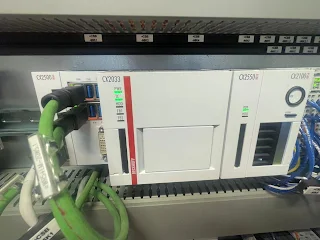First level
Add routing, open TSM file, activate, open PLC Control, and create boot program.
Personnel requirements:
Engineering personnel familiar with TwinCAT operations.
Code requirements:
All source code and library files must be compiled and passed.
Equipment requirements:
Install a laptop or desktop computer with TwinCAT development version.
Site requirements:
Developers must be present at the equipment site.
Applicable occasions:
During the development of new models, the development engineer always debugs and updates the program at the end user's location.
Second level
Only changed the PLC program, generated a. wbp file, sent an email to the on-site personnel, and copied it to the boot folder
Personnel requirements:
Familiar with the Windows environment and able to copy files.
Code requirement:
None.
Equipment requirements:
Monitor or laptop running CE desktop takeover software CERHOST.
Site requirements:
Developers do not need to be on site, but there must be someone on site to perform file copying operations.
Applicable occasions:
The program of the mass-produced model has been slightly modified, and the equipment has been sent to a remote site.
Third level
Remake and distribute the entire CF card
Personnel requirements:
Familiar with the Windows environment and able to copy files.
Code requirement:
Equipment requirements:
Card reader, computer, and backup/recovery tool software, such as Beckhoff Servcie.
Site requirements:
Completed within the OEM equipment factory, but no developer participation is required.
Applicable occasions:
Large batch production machines, controllers taken out of the warehouse, and unified system and program brushing.
Fourth level
Compress the entire Boot folder, send an email to the on-site personnel, extract and copy it to the Boot folder
Personnel requirements:
Familiar with the Windows environment and able to copy files.
Code requirement:
None.
Equipment requirements:
Monitor or laptop running CE desktop takeover software CERHOST.
Site requirements:
Developers do not need to be on site, but there must be someone on site to perform file copying operations.
Applicable occasions:
The program of the mass production model has undergone significant modifications, and the equipment has been sent to a long distance on-site.
Fifth level
The new version of the PLC program and configuration is placed on the USB flash drive, inserted into the controller, and automatically updated
Personnel requirement:
Able to plug and unplug a USB flash drive and power off the controller.
Code requirement:
None.
Equipment requirements:
None
Site requirements:
Developers do not need to be on site, but someone should be there to plug and unplug the USB drive.
Applicable occasions:
The program of the mass production model has undergone significant modifications, and the equipment has been sent to a remote site.
Sixth level
VPN router, remote maintenance, and program updates.
Personnel requirements:
Engineering personnel familiar with TwinCAT operations.
Code requirements:
All source code and library files must be compiled and passed.
Equipment requirements:
The controller should be able to connect to the external network to ensure VPN connectivity. A laptop or desktop computer with TC installed.
Site requirements:
Developers do not need to go to the equipment site and operate directly in the office.
Applicable occasions:
remote fault diagnosis, maintenance procedures.
Seventh level
Specialized software developed using TwinCAT Automation Interface
Personnel requirements:
Grassroots operators familiar with the specialized software.
Code requirement:
None.
Equipment requirements:
TC and dedicated software laptops or desktops.
Site requirements:
Operators should go to the side of the machine, and the laptop and controller should be connected through a local area network.
Applicable occasions:
Equipped with senior IT engineers and a large number of automation engineers at different levels.Large enterprises with code management requirements have the ability to build their own specialized development platforms and encapsulate unique process objects. Grassroots engineers can complete device development work relatively easily without having to delve into TwinCAT or understand the underlying code. Program updates are just one small feature.
Eighth level,
Place the latest program on the program server, run the exe file, and copy the PLC program to the controller through TcpIp.
Personnel requirements:
It depends on the exe file, such as whether to choose a program version, and can also be an unmanned person
Code requirement:
None.
Device requirements:
The program update server is connected to the controller through a local area network or virtual local area network.
Site requirements:
None.
Applicable occasions:
Distributed controllers in the area require batch update of program versions.
Ninth level
IoT technology, monitoring from the cloud, which devices need to be updated, and determining whether to update the program based on preset conditions
Personnel requirements:
None
Code requirement:
None.
Equipment requirements:
Cloud server, with the latest PLC program on it, and the controller can also connect to the cloud.
Site requirements:
None.
Applicable occasions:
Companies with branches worldwide, or manufacturers selling equipment to the world, regularly upgrading programs.

The seventh, eighth, and ninth level all require high-level language development, and the final layer also requires cloud servers. I know that some customers have used it, but I have not yet operated it myself. Welcome everyone to discuss in the message area.
Like my work? Consider a donation! 👇

